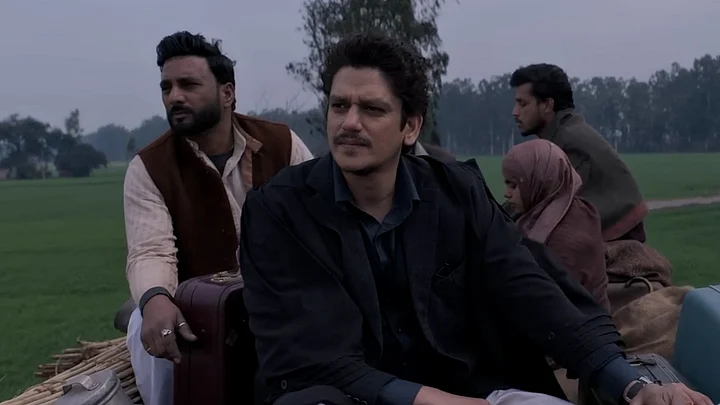Director Vibhu Puri’s new film Gustaakh Ishq is essentially a homage to the two filmmakers he has been previously associated with: Sanjay Leela Bhansali and Vishal Bhardwaj.
From Bhansali, we get the film's flavourful dialogue. Like when a poet laments, ‘Aaina aur dil banay hai tootnay kay liye.’ Or when a woman says of her ex-husband, ‘Pati naheen, galati.’ A woman’s dimples are described as 'gaalon mein pyaaliyaan' (cups in her cheeks)—how picturesque.
Meanwhile, Bhardwaj (along with his eternal collaborator Gulzar) fills the film with a familiar soundtrack, churning out songs in his typical, auteuristic style—the lilting ‘Ul Julool Ishq’ is in the tradition of ‘Dil Toh Bachcha Hai Ji’, while ‘Aap is Dhoop Mein’ follows his more meditative compositions such as ‘Jhelum’ and ‘Yeshu’.
And in paying homage to his forbears, Puri makes a film that pays homage to a time gone by. Set in 1998–99, this is the story of Pappan urf (alias) Nawabuddin Saifuddin Rehman (played competently by Vijay Varma), himself a nostalgic man desperately trying to keep his late father’s printing press running. His younger, more modern brother, Jumman (Rohan Verma, who is superb), disparages Pappan’s idealism. Caught between the warring brothers is their indulgent mother (played by Natasha Rastogi who is rather wasted in this role).
Poetry and Love
But then Pappan finds a beacon of hope. He learns about the poet Aziz, now in his sixties and a celebrated shayar of Pappan’s father’s generation, but one who, despite acclaim in mushairas, never published his work.
Pappan sets off to the town of Malerkotla, Punjab, to convince Aziz to let him print his poems (thereby also securing the fortunes of the failing printing press).
Naseeruddin Shah puts in a characteristically assured performance as Aziz, a jovial man whose love for poetry burns fiercely despite his many setbacks. In another of Puri and co-writer Prasshant Jha’s memorable dialogues, Aziz declares, ‘Machhli tairna bhool sakti hai, shayar sher likhna naheen!’
In Aziz’s home, Pappan also meets Aziz’s daughter Mannat urf Mini (Fatima Sana Shaikh), who is initially suspicious of this man noseying around her father, but quickly warms up to him. Pappan initially woos her with flowers and shayari, but ultimately wins her over when he stands up for her in a moment of distress.
Shaikh is good in an underwritten role and the film is clearly as in love with her as Pappan: she is introduced through close-ups of her eyes and lips, and cinematographer Manush Nandan never loses an opportunity to frame her face with those 'pyaaliyaan' in her cheeks. Still, it’s a pity Puri and Jha did not write more for her to work with.
Old-World Charms
Puri conducts a low-key charmer of a film around these players: it’s a suitably twisty story, simply and ably told. The interval point is a literal parting of the ways. The climactic reveals and motivations are weighted with emotional underpinnings. The performances all meld well together.
Puri is confident in wielding what could be seen as clichés: the attractive woman revealed suddenly as romantically unavailable; the printing press owner dropping dead as his press carries mercilessly on; thunder and rain accompanying sombre moments.
And these gentle, old-world tropes are particularly useful in tiding us over some of the screenplay’s bumps—such as a sudden altercation in the film’s second half, or the fact that Mannat’s troubled past is bizarrely forgotten about after being mentioned just twice (especially in a film that eulogises the past!). Indeed, the love story of Pappan and Mannat becomes a bit of an afterthought in this tale of poetry and past glory.
As we become more invested in Aziz’s history and the fate of his work, it becomes tougher to see what is gained by having this love story around at all. It’s given closure through a three-years-later coda that is, if anything, even more of an afterthought.
Gustaakh Ishq stays true to the slogan its posters carried: 'kuchh pehlay jaisa'. It’s a throwback to simpler times (particularly in its focus on the Urdu language and Muslim protagonists). As the first major theatrical release from Manish Malhotra’s Stage5 Production, it isn’t groundbreaking and nor does it promise to be long-lasting, but its earnestness is undeniable.
You can watch the film in theatres.
(Sahir Avik D'souza is a writer based in Mumbai. His work has been published by Film Companion, TimeOut, The Indian Express and EPW. He is an editorial assistant at Marg magazine.)
